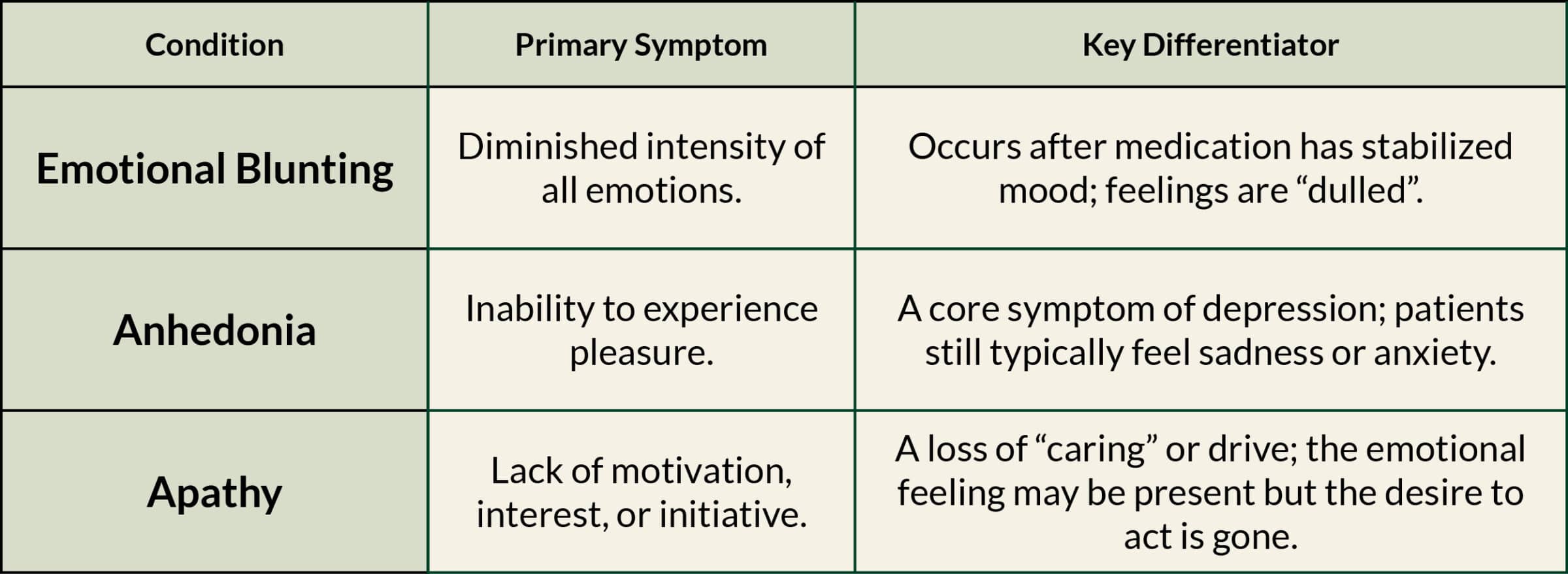The experience of finally finding relief from depression or anxiety can be life-changing. But for many, the extreme sadness and fear are replaced by something unexpected and unsettling: a feeling of being emotionally numb. You know you should feel joy or sadness, but the reaction is simply flat.
You are not alone. This side effect of SSRI emotional blunting is clinically known as Antidepressant-Induced Emotional Blunting (AIEB).
At the Center for Effective Treatment (CET) in Boulder, we specialize in working with people whose complex symptoms—like feeling emotionally blunt—have been missed, misunderstood, or dismissed by standard care. We understand the frustration of feeling like your treatment isn’t working, or finding yourself looking for a new therapist after your previous one felt stuck. This guide offers clarity on what AIEB is and how we approach finding a full emotional recovery.
What Exactly is SSRI Emotional Blunting?
SSRI emotional blunting is a widely reported side effect where a person experiences a significant reduction in the intensity of their emotions. It is most commonly associated with selective serotonin reuptake inhibitors (SSRIs) and serotonin-norepinephrine reuptake inhibitors (SNRIs), and research suggests it affects between 40% and 60% of patients taking these medications.
Key Symptoms of SSRI Emotional Blunting
Patients with AIEB often describe a core shift in their personality and their relationship to the world. Key reports include:
- Dampened Emotional Intensity: Experiencing both positive (joy, love, excitement) and negative (sadness, anger, fear) emotions as significantly muted or distant.
- Feeling Detached: Feeling like an “observer” of your own life rather than a participant or feeling disconnected from loved ones.
- Loss of Reactivity: Being unable to cry at sad events or laugh heartily at jokes, even when appropriate.
- Loss of Empathy: Feeling less able to connect with or respond genuinely to the emotions of others.
Blunting vs. Anhedonia vs. Apathy
It is crucial for effective treatment to differentiate AIEB from other emotional states:

Why Does SSRI Emotional Blunting Happen?
The exact mechanism behind AIEB is complex, but current research points to how SSRIs interact with the brain’s emotional and reward centers. SSRIs work by increasing the availability of serotonin, which is beneficial for reducing symptoms of anxiety and depression.
The trade-off is that this surge in serotonin can inadvertently dampen activity in brain areas responsible for emotional processing and reward. By raising the floor (reducing the depth of sadness), the medication can also lower the ceiling (reducing the peak of joy). This affects the brain’s ability to use positive and negative feedback (reinforcement learning) to guide emotional responses.
Addressing the Duration: Does Emotional Blunting Go Away?
The good news is that for most patients who are experiencing SSRI emotional blunting is that it does go away upon successful adjustment or discontinuation of the medication.
However, the timeline for emotional recovery varies dramatically and is highly individual, depending on the medication, dosage, and duration of use.
- During Treatment: For many, the blunting persists as long as they are taking the medication, especially at higher doses. It is often dose-dependent.
- After Discontinuation: When working with a professional to safely taper the medication, patients typically report their emotions returning, sometimes over a period of weeks, though it can take months or even longer for the brain to fully readjust its baseline chemical function.
CRITICAL WARNING:
Because of the complex changes in brain chemistry, never attempt to stop or change your dosage suddenly without supervision. Abruptly stopping medication can lead to severe withdrawal symptoms and is detrimental to your recovery.
Management Strategies: How We Approach Complex SSRI Emotional Blunting

We understand that persistent SSRI emotional blunting is often a sign that standard treatment has reached its limits. We employ a specialized, sophisticated approach that goes beyond simply adjusting a prescription.
Pharmacological Adjustments
The first line of care is always working collaboratively with a prescribing provider (psychiatrist or psychiatric nurse) to tailor the medication:
- Dose Reduction: Carefully and gradually lowering the current SSRI dosage.
- Medication Switch: Transitioning to a different class of medication (e.g., Bupropion, Vortioxetine, Mirtazapine) that may carry a lower risk of blunting.
- Augmentation: Keeping the SSRI dose low and adding a second agent to boost the dopamine or reward pathways.
Specialized Therapeutic Interventions
At the Center for Effective Treatment, our approach is to figure out WHY the patient is struggling and to treat the underlying cause, rather than just masking the residual symptoms. We work with clients who need specialized therapies when a standard treatment fails:
- DBT Therapy / DBT Group Therapy: These structured therapies are ideal for developing emotional regulation skills and distress tolerance—skills that may have been underdeveloped or masked by years of depression or anxiety.
- EMDR Therapy: If the emotional blunting is a protective mechanism stemming from past trauma (unresolved issues are often mistaken for “emotional flatness”), EMDR can help process those experiences, allowing emotions to safely “unstick” and return to a functional range.
- Addressing the “Why”: Emotional numbness can be a defense mechanism—part of the anxiety avoidance cycle—where the brain chooses numbness over pain. Our therapists are trained to identify and gently reverse this cycle.
Finding a Balanced Treatment with a Professional
Feeling emotionally blunt does not mean you have failed at treatment. It means you are ready for a more personalized, specialized approach. Our goal at the Center for Effective Treatment is not just to alleviate the symptoms of depression, but to restore your full emotional range and quality of life.
We provide comprehensive mental health services—including evaluation, medication management, and advanced therapy—for those in the Boulder area and beyond (online and in-person). We are the clinic where people who feel overlooked, or those whose previous therapy wasn’t working, find a path forward.
If you are experiencing complex symptoms like persistent SSRI emotional blunting and are ready for a sophisticated, effective treatment approach, schedule a consultation today.

